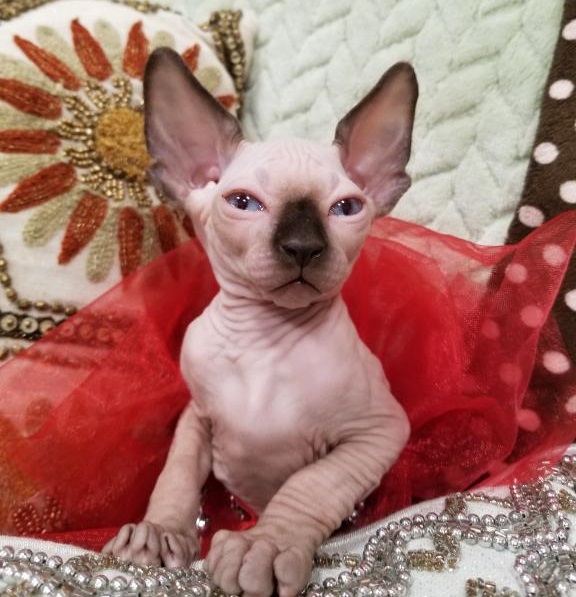When you think of a cat, you probably imagine a furry, cuddly companion. However, there’s a unique breed of cats that defies that expectation: the Sphynx. This breed, known for its lack of fur and distinctive appearance, has captured the hearts of cat lovers around the world. If you’re searching for a cat with no fur for sale, it’s likely that the Sphynx is at the top of your list. In this guide, we’ll cover everything you need to know about purchasing and caring for these fascinating felines.
What Is a Sphynx Cat?
The Sphynx cat is renowned for its hairless body, large ears, and prominent cheekbones, making it one of the most instantly recognizable breeds. Despite its appearance, the Sphynx cat is not entirely hairless; they have a soft, peach-fuzz-like down covering their skin, giving them a suede-like texture to the touch.
Sphynx cats are known for their affectionate and playful personalities. They are social creatures that thrive on human attention and enjoy being the center of attention. These cats often follow their owners around, seek out warmth, and love to snuggle, making them ideal pets for those who want a close bond with their cat.
Why Choose a Hairless Cat?
While the Sphynx’s appearance is certainly unique, it’s their personality that truly wins over cat owners. They are friendly, energetic, and curious, often acting more like dogs than cats. Their love for human companionship and playtime makes them a joy to have around.
In addition to their affectionate nature, hairless cats like the Sphynx are also an attractive option for people with allergies. While no cat is completely hypoallergenic, the Sphynx produces less dander than many furry breeds, which can make them more tolerable for those who are allergic to cats.
Where to Buy Cats with No Fur
If you’ve decided that a hairless cat is the right pet for you, the next step is finding a reputable breeder. Buying a cat with no fur, particularly a Sphynx, requires careful consideration to ensure that you’re getting a healthy, well-bred kitten. Here are some tips on finding a trustworthy breeder:
1. Research the Breeder:
Look for breeders who are registered with recognized cat breeding associations like The International Cat Association (TICA) or the Cat Fanciers’ Association (CFA). Reputable breeders will have a solid reputation and positive reviews from previous buyers.
2. Health Screening*:
Sphynx cats are prone to certain genetic health issues, including heart conditions like hypertrophic cardiomyopathy (HCM). Responsible breeders will screen their cats for these conditions and provide health certificates for the kittens.
3. Visit in Person:
If possible, visit the breeder’s home or facility to see the kittens and their living conditions. The kittens should be well-socialized, clean, and raised in a safe, nurturing environment.
4. Avoid Online Scams?
Be wary of breeders or websites offering Sphynx cats at unusually low prices or requesting large payments upfront without allowing you to see the kitten. Scammers are common in the pet trade, especially for rare breeds like the Sphynx.
The Cost of Hairless Cats
Buying a Sphynx cat or any other hairless breed typically comes with a high price tag. Depending on the breeder, pedigree, and location, Sphynx kittens can cost anywhere from $1,500 to $4,000 or more. Cats with show-quality pedigrees will generally be on the higher end of the price spectrum.
In addition to the initial purchase price, owning a Sphynx cat comes with other costs, such as:
Grooming supplies:
Although they don’t have fur, Sphynx cats require regular baths to remove oils that would normally be absorbed by fur.
High-quality food:
Sphynx cats have fast metabolisms and require a well-balanced, high-protein diet.
Veterinary care:
Regular vet visits are important for monitoring the health of your Sphynx, especially to check for any genetic health conditions.
Warm clothing and bedding:
Hairless cats are more sensitive to temperature changes, so they may need extra warmth in colder environments.
Caring for Your Hairless Cat
Owning a Sphynx or any hairless cat requires a bit more care and attention than owning a typical furry cat. Here are some of the unique care needs for hairless cats:
1. Bathing:
Since they don’t have fur to absorb oils, hairless cats need regular baths, usually once a week, to keep their skin clean and free of oil build-up. Use a gentle cat-specific shampoo to avoid irritating their sensitive skin.
2. Sun Protection:
Without fur, Sphynx cats are susceptible to sunburn. If your cat spends time in direct sunlight, consider using a pet-safe sunscreen or limit their exposure to prevent skin damage.
3. Temperature Sensitivity:
Hairless cats tend to get cold more easily than other breeds, so it’s important to keep them in a warm environment. Many owners buy sweaters or blankets for their Sphynx to keep them comfortable during colder months.
4. Health Monitoring:
Sphynx cats can be prone to certain genetic health issues, so regular vet check-ups are crucial. Be aware of any changes in their behavior, appetite, or physical appearance, and consult a veterinarian if you notice any concerns.
Conclusion
Buying a hairless cat, such as a Sphynx, is a unique and rewarding experience. These cats are not only known for their striking appearance but also for their loving, playful, and social nature. If you’re looking for a cat with no fur for sale, take the time to find a reputable breeder, be prepared for the costs involved, and ensure you’re ready to provide the care they need.
With the right preparation, your Sphynx cat will be a loyal and affectionate companion, providing years of joy and companionship in your home


